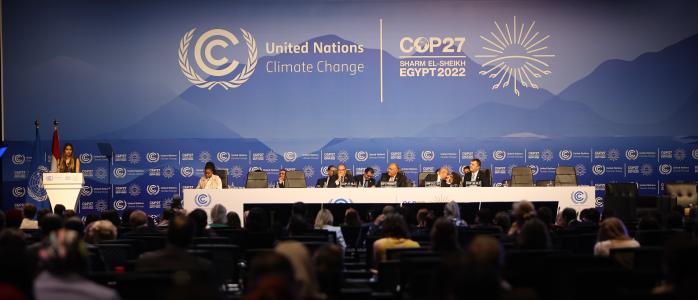



All eyes are on COP26. The UN’s annual climate conference, scheduled to begin on 31 October 2021 in Glasgow, will mark a watershed moment in international climate negotiations. While climate change is intensifying faster than expected, national mitigation targets remain inadequate to achieve the Paris Agreement’s goal to limit global warming to 1.5°C—or at least “well below 2°C”—compared to pre-industrial levels. Recently, UN Secretary-General António Guterres said staying on a 1.5°C pathway will be “impossible” without “immediate, rapid, and large-scale reductions in greenhouse gas emissions”.
This year’s negotiations in Glasgow are already shaping up to be the most fraught meeting of the parties to the UN Framework Convention on Climate Change (UNFCCC) since COP21 in Paris. They will likely involve deliberations on climate finance, accelerating decarbonisation, and mechanisms for improving adaptation and resilience. There could be a flurry of announcements. It can be a lot to take in, so we at CEEW’s climate negotiations team have pinned down seven key outcomes that, if achieved at COP26, would help salvage the objectives of the Paris Agreement and significantly advance the global fight against climate change. We hope they can serve as a yardstick that readers can use to measure the progress of the upcoming summit.
1. Climate finance
This is one of the most important issues on the table at COP26. While developed countries have pledged financial support for climate action in developing countries, funding has fallen far short of the target: USD 100 billion per year by 2020. At COP26, world leaders must lay out a clear strategy for implementing financial disbursals, eliminating financial stress, and ensuring that developed countries honour their commitments.
2. Equitable distribution of carbon space
A recent CEEW study shows that developed countries collectively emitted around 25 gigatonnes of CO2 equivalent (GtCO2eq) more than their estimated emission allowances between 2008 and 2020. These excess emissions were the result of their lack of participation in climate agreements and their misuse of accounting provisions. The Glasgow summit should hold developed countries to account for their actions by directly deducting the additional carbon space they consumed in the pre-2020 period from their post-2020 carbon budget.
3. Enhancing climate plans and accelerating action
COP26 must significantly advance the implementation of current national climate action plans, known as Nationally Determined Contributions (NDCs). The summit should respond to the findings of the most recent NDC synthesis report and focus on implementing strategies for sectoral transformation, decarbonisation, and resilience. It must also encourage countries to ratchet up ambitions in the next round of NDCs, due by 2025.
4. Reporting
At COP26, countries must agree to report greenhouse gas emissions in common tabular formats (CTFs) and use structured summaries to report information necessary to track NDC progress. Further, the conference offers participants an opportunity to rectify existing loopholes in financial accounting. Examples include treating loans as equivalent to grants, and accounting budgets for full projects despite using only a small portion of the funds to combat climate change. The summit is also an occasion to take stock of countries’ progress with respect to emissions reduction commitments, support adaptation, and capacity considerations.
5. Loss and Damage (L&D)
COP26 needs to ensure the establishment and full operationalisation of a dedicated loss and damage (L&D) finance facility to mobilise support for developing countries‘ efforts to avert, minimise and address the destructive impacts of climate change. Further, discussions of the new climate finance goal scheduled to come into effect from 2025 should take L&D into account. Finally, the summit must devise a mechanism to ensure that all countries include L&D as a core element in their long-term climate action strategy.
6. Global Goal on Adaptation
The Glasgow summit must help operationalise the Global Goal on Adaptation (GGA), which requires countries to undertake—and communicate—efforts to enhance their adaptive capacity and strengthen resilience. Doing so will involve developing clear and defined methodologies to translate the GGA into national frameworks, and providing adequate financial and technical support to implement its objectives on the ground. Deliberations at COP26 should also facilitate a higher scale of adaptation finance.
7. Carbon markets
A controversial issue that COP26 must resolve is that of carbon markets, where countries can buy and sell carbon edits. Countries must break the current impasse in discussions on the structure and exchange mechanism of carbon credits, and agree on a comprehensive accounting approach to ensure environmental integrity. Further, they should explore opportunities for a smooth transition of the carbon credits in the Kyoto Protocol to the Paris Agreement.
All these outcomes are tough asks, but they are critical for real progress on climate action. We believe that a successful COP will involve a well-balanced set of ambitious, evidence-based decisions that represent all stakeholders' expectations and concerns, and constitute a strong political signal on global climate cooperation. The Glasgow summit is our final chance to promote quick and equitable reductions in all greenhouse gas emissions and a just transition to a greener, safer world.
Jhalak Aggarwal is a Research Analyst, Sumit Prasad is a Programme Associate, and Shikha Bhasin is Senior Programme Lead at the Council on Energy, Environment and Water; Send your comments to [email protected] and [email protected]






Add new comment